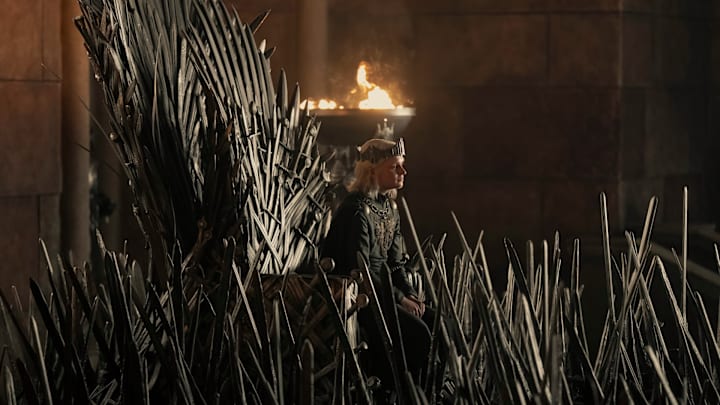History is written by the victor. It’s something that we always have to remember when it comes to school. House of the Dragon is doing an excellent job of reminding us of that.
The first season made some substantial changes to the story of Fire & Blood by George R.R. Martin. One that stands out to most is Leanor’s “death,” which we learn was faked. However, there are things like how Alicent thought Viserys was telling her Aegon was the rightful heir, and how Luc and Arrax really died at the hands of Aemond and Vhagar.
The second season is sure to continue some of the changes. Just look at the fact that Nettles doesn’t seem to be part of the story. This all serves a purpose. It’s not that the House of the Dragon writers are changing the story. It’s that they’re pointing out a flaw in historical texts.
Fire & Blood by George R.R. Martin isn’t a typical novel
Those who have read Fire & Blood will know that this isn’t a standard novel. We don’t follow the characters as events happen. This is a historical text written off the back of three different accounts of events throughout the Targaryen rule.
Those events often differ. It’s up to the reader to decide which is the truth—or which is closest to the truth. Nothing is to be taken as pure fact.
History is written by the victor. We even see that in the novel itself. When Aegon gets the throne back from Rhaenyra, her whole rule is wiped out from the history books. Think of Game of Thrones when it’s made clear that Westeros has never had a queen. Well, that’s not true. It’s just that Aegon, as the victor over Rhaenyra at the time, wrote her out of history.
The three who tell the tale of the events are sharing their stories. They’re leaving out things they don’t think is important or things that they haven’t actually seen. Some of them put themselves into the story at times. Then there are conversations that happen behind closed doors that are just assumed or forgotten.
House of the Dragon needs to fill in the gaps. It needs to make sense of the three versions of the story. It’s what I love about the change to Leanor’s “death.” The three accounts are left to believe that Laenor was killed and burned beyond recognition. Nobody would be privy to what actually happened to get Laenor out of Westeros to do what he wanted and for Rhaenyra to marry Daemon as she wished.
So, the next time you say that House of the Dragon has changed something, assess whether something has actually changed. Has the series filled in the blank, or has it reminded us that history is actually written by the victor? Just because the historical text says something happened in a particular way doesn’t mean that it did.
